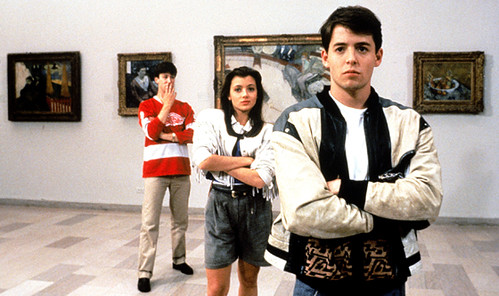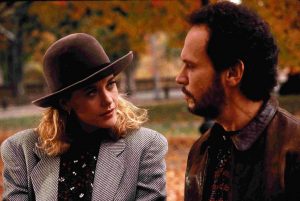Let’s face it: who among us hasn’t taken an unwarranted sick day? Even if you love work or school (which, ok …), sometimes there’s an intense itch for the kind of freedom you can only get off the clock. A charming ode to the sick day, Ferris Bueller’s Day Off (1986) is the perfect coming-of-age movie, less concerned about mourning the end of childhood and hand-wringing about the future than embracing the moment. While Ferris (Matthew Broderick) might be the face of the film, Cameron’s (Alan Ruck) anxiety and insecurity make it a true underdog story—one that you can’t help but laugh (and cry) along with.
As philosophical as it is funny, Ferris is one of the most iconic American comedies, and for good reason. While any of director John Hughes’s works would have a valid claim to that accolade, Ferris has a uniquely widespread cultural impact. In both writing and iconography, the film has a spate of memorable moments and quotable lines, from Cameron’s intense examination of Seurat’s pointilist masterpiece “A Sunday Afternoon on the Island of La Grande Jatte” to Principal Ed Rooney’s (Jeffrey Jones) absurdly enunciated “nine times.” Nearly forty years later, Ferris continues to appeal to viewers of all ages with its poignant reflections on living life to the fullest, lightened by a hearty dose of slapstick.
Ferris follows the charming flaneur Ferris Bueller as he fakes illness to get out of school. Not content to spend the day at home, Ferris enlists his girlfriend Sloane (Mia Sara) and his neurotic best friend Cameron in his quest to make the most out of his time playing hooky. Together, the gang enjoy the sights of Chicago and try to keep up the ruse of Ferris’s illness, all while dodging the elder Buellers and the ruthless Principal Rooney.
Ferris establishes himself early on as a somewhat unusual narrator, frequently breaking the fourth wall to justify his illicit actions. This directorial move allows Ferris to reflect on his experience in real time and unironically posit philosophical gems. “Life moves pretty fast. If you don’t stop and look around once in a while, you could miss it,” he explains. That iconic line comes within the first five minutes of the film, quickly establishing the central question driving Ferris and Cameron: what does it mean to have a life well lived? While Ferris’s answer is fairly evident, it’s Cameron’s search for meaning that forms the emotional center of the film.
It’s possible to imagine a version of Ferris that’s ridiculously corny, but both Ruck and Broderick bring the perfect level of sincerity to their characters, never letting them retreat entirely into their all-too-familiar high school archetypes. The two are an unlikely duo: Ferris’s easy, affable nature sharply conflicts with Cameron’s constant anxiety about the past, present, and future. As Ferris aptly puts it, “Cameron is so tight that if you stuck a lump of coal up his ass, in two weeks you’d have a diamond.” Still, Ferris and Cameron are hardly one-dimensional caricatures of the lovable rogue and the humorless stickler. While Ferris is (almost) universally celebrated as a “righteous dude,” Cameron’s anxieties about his uncertain future reflect the viewer’s own concerns while his conflicting desires for validation and control over his own life are deeply relatable in a way that the resolve of the breezily self-assured Ferris isn’t. Sure, Ferris is fun to watch, but it’s hard to really root for him; Cameron’s wavering and wobbles, on the other hand, give the film its stakes. When Cameron finally decides he will no longer “sit idly by as events that affect [him] unfold to change the course of [his] life,” it’s a triumph that feels much larger than the scope of this seemingly happy-go-lucky film.
Part of the genius of Ferris lies in its celebration of the minutiae. When Cameron flippantly proclaims he’s seen “nothing good,” the whole day, Ferris sputtering response, “we’ve seen everything good,” rings true, even if the gang’s activities—going to an art museum, having lunch at a fancy restaurant, watching a baseball game—are mundane and almost impossibly wholesome. Like most teenage apathy, though, Cameron’s response is merely a front for his own inner turmoil, which by the end of the film has been eroded by Ferris’s perpetual optimism and love for life.
Of course, Ferris is first and foremost a comedy, and yet, after nearly forty years the jokes in Ferris somehow manage to feel timeless. Its reliance on long-since obsolete technology—from the landline to the front door buzzer—is expertly used for comedic purposes, obscuring its datedness. Ferris’s intricate choreography of answering machines and front door buzzers reveals his downplayed intelligence while simultaneously setting up Principal Rooney for a near-endless series of gaffes. Jones’s over-the-top villainy as Rooney provides a steady stream of schadenfreude that never fails to entertain on repeated rewatches. Ferris’s constant near-misses set a lively pace, creating a cycle of suspense and comedic relief that makes the 112 minutes fly by.
While the moments of slapstick could risk seeming juvenile, Hughes’s innovative camerawork keeps the film fresh and inventive while still being accessible. From the sequence of close-ups during a particularly dull economics class to the panoramic views of Chicago, every shot feels intentional without compromising the unstudied air needed for a lighthearted comedy.
Clearly, the appetite for Ferris isn’t gone—from an ill-fated sitcom to a Super Bowl commercial to a Paramount+ spin-off (currently in development, the series will be based on the two valets who drove off in Cameron’s father’s Ferrari), Ferris continues to live on. It’s a movie that feels just as good to watch at 21 as it did at 11, if not more—its message of embracing each day as it comes serves as the perfect advice for the anxiety-inducing aimlessness of postgrad life.





